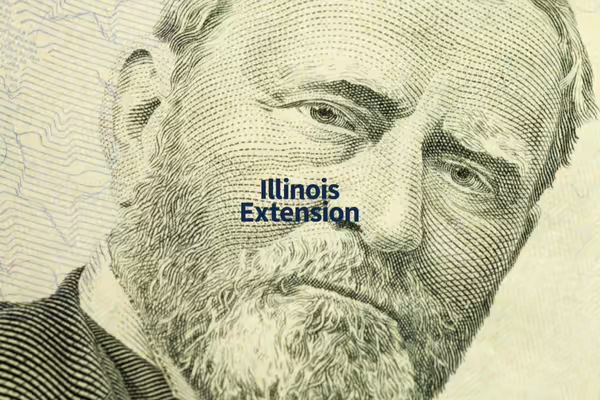
URBANA, Ill. – Four University of Illinois Extension projects have been awarded grants from the Extension Foundation as part of its fourth year of the New Technologies for Ag Extension program.
“NTAE grants provide opportunities for our Extension professionals to be creative in their problem-solving and program development to find innovative solutions to grand challenges facing us,” says Shelly Nickols-Richardson, associate dean of the College of Agricultural, Consumer and Environmental Sciences and director of Illinois Extension. “These grants offer the needed spark to further ideas, bolster collaborations, and expand impact.”
- The Illinois Extension projects selected to receive awards this year are:
- Building a Culture of Composting in Greater Chicagoland
- Developing a Sustainable Model for Community-Engaged Dissemination of Health Research to Benefit the Public
- Developing Climate Relevant Content for Extension Programs
- Interoperability Challenges in AgTech
Building a Culture of Composting in Greater Chicagoland
Kathryn Pereira, Illinois Extension local foods systems and small farms educator, leads a composting project team that aims to divert food scraps and organic waste from landfills. Ultimately, increased education on the benefits of composting will lead to increased access to composting services which will in turn reduce greenhouse gas emissions from landfills.
“In 2015 1.3% of food scraps and 14.3% of all organic waste was diverted from Illinois landfills, leaving ample opportunity for improvement,” Pereira says. “In Chicago, annual food waste diversion would equal the equivalent of removing more than 29,000 cars a year from the road, saving more than $4 million in landfill tipping fees.” Removing Halloween pumpkins from the waste stream could result in a cost savings of $500,000 alone.
By partnering with community organizations on Chicago’s southside and engaging Chicago Public Schools, the program brings youthful energy and engages new compost converts during “Pumpkin Smash” and composting events in Cook County. Now with the assistance of the grant funds, the program has expanded to include Lake and McHenry counties and is seeking additional partnerships with educators and organizations from counties surrounding Cook County.
A regional compost summit to be held in May 2023 will develop models for small food business to handle their food waste in environmentally friendly ways. “Our work is intended to spur a regional culture of composting to allow for economic development around compost collection, environmental equity, increased access to composting services, finished compost for local food production, and education for all on the benefits of organic waste separation,” says Pereira. “Ultimately, we believe composting in the state of Illinois should be as ubiquitous and accessible as recycling.”
Nickols-Richardson acknowledges the expansion of composting efforts by the team. “I applaud the composition of the working team that has been assembled, and I believe that this project will make an important contribution to reducing organic matter in the waste stream,” says Nickols-Richardson. “I am confident that the proposed activities of this project will shift the perception of organic material from waste into resource.”
Developing a Sustainable Model for Community-Engaged Dissemination of Health Research to Benefit the Public
Chelsey Byers, Illinois Extension family life educator, says the NTAE acceleration project grant will help expand the reach of the Community Seminar Series, a health awareness program in its third year. “Our goal is to diversify our attendees while also developing a playbook that will allow other land-grant universities to create similar community outreach programs,” Byers says. “The NTAE program has introduced us to Extension professionals across the country willing to assist us in project-specific areas, such as design work, evaluation implementation, program review, and process analysis, as well as many other specialties that will help us grow and develop these beneficial programs.”
The series is a collaboration with other University of Illinois departments, students, and researchers, including the Interdisciplinary Health Sciences Institute. “The Community Seminar Series is a unique program that brings Illinois Extension educators together with graduate students and postdoctoral researchers to translate scientific findings into usable applications and relevant information for Illinoisans,” says Nickols-Richardson. “NTAE will support replication of this program across the Cooperative Extension Service system.”
USDA National Institute of Food and Agriculture funds the program in partnership with Oklahoma State University and the Extension Foundation. Projects that expand into state, regional or national projects receive $60,000. Grants to accelerate early-stage projects are $10,000 each, and grants to create pilot programs are $5,000.
ABOUT EXTENSION FOUNDATION: The Extension Foundation is a nonprofit formed in 2006 by Extension Directors and Administrators. The Foundation partners with Cooperative Extension through liaison roles and a formal plan of work with the Extension Committee on Organization and Policy (ECOP) to increase system capacity while providing programmatic services and helping Extension programs scale and investigate new methods and models for implementing programs.
ABOUT EXTENSION: Illinois Extension leads public outreach for University of Illinois by translating research into action plans that allow Illinois families, businesses, and community leaders to solve problems, make informed decisions, and adapt to changes and opportunities.